Blue Prince Review
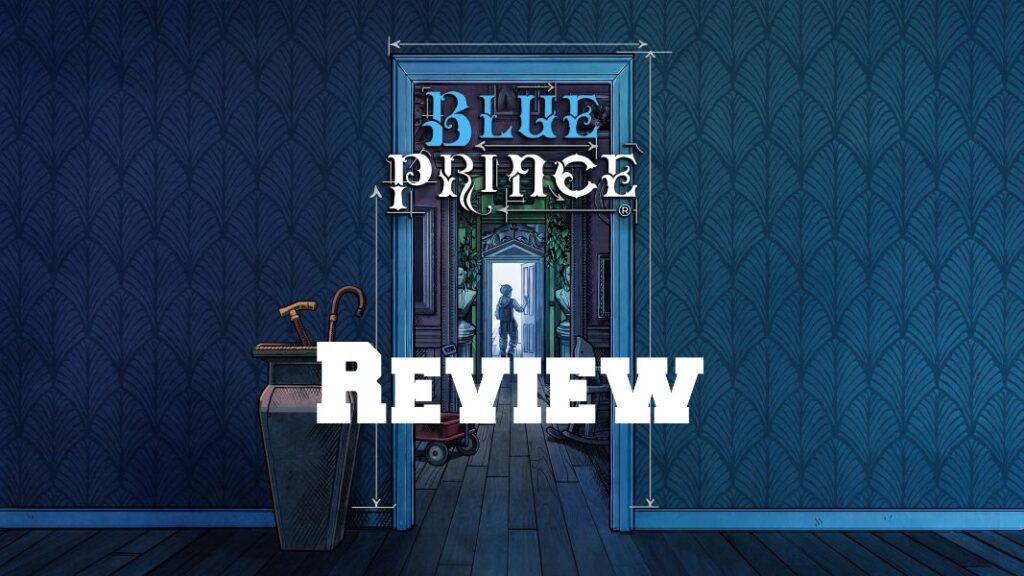
Blue Prince is probably the best game I’ve ever played that I think you should be ready to drop without a moment’s notice.
Part spirelike, part first person puzzle game, Blue Prince is a discovery generation engine, a platform for players to exercise their minds in myriad ways. It’s a game where every time you learn something new, it dawns on you how little you know.
The basics are simple. You’ve just inherited your great uncle’s estate and the mansion it contains. There’s one condition. Instead of spending one night in the mansion, you instead simply need to reach its 46th room.
So far so simple, right?
You enter the lobby of the mansion, and you’re presented with three doors. With naught to go on, you pick one—the left—and so begins your adventure.
You are presented with three options. Rooms. You look at the map, and you realize this house presently only has two—the lobby, and something called the antechamber. Seven rows of blank spaces across five columns sit between your current location and the antechamber, the room before your goal.

Instinctively, you select a room with a right-hand turn to it. Obviously you need a door facing ‘northwards’: the direction of your goal. You walk through it. It costs you a step? But you have 50, so it’s ok. It’s a parlour, and it has, oddly, three stands with boxes on them standing in one corner. Each box has a different statement. There doesn’t appear to be any way to open them.
You search the room, and you find a wind-up handle. Some paper below the handle explains the puzzle, although you probably already worked it out yourself. You choose the correct box, and inside are some gems.
You’re one room in, and you’ve already discovered and resolved a handful of questions. Questions you didn’t know existed before—didn’t have context for the existence of before. And now you have more questions. What are gems? What’s with the steps? What room will you pick next? What is the best way to get to the antechamber? What happens once you get there?
As you start to answer these questions, more arise. And more. And more. Everything in the game becomes a clue. The artworks, the colours of the rooms, the papers on the desks, the vents on the ceilings, the different keys you find. All of them lead you to more questions, and once answered, you get more questions again.
It feels, for a very long time, like you never stop learning in Blue Prince. There’s always some new information that is either just out of reach or suddenly coming to light.
The drafting of rooms plays a big role in this. By pairing an escape room (escape mansion, maybe) with a spirelike, even when you don’t yet have sufficient information to solve a puzzle, you’re still learning about the rooms you’re drafting and placing. Spirelikes are discovery generation engines at their core, games that revolve around the player slowly gaining mastery over the knowledge base that is available cards and using that knowledge to play the right ones at the right time.
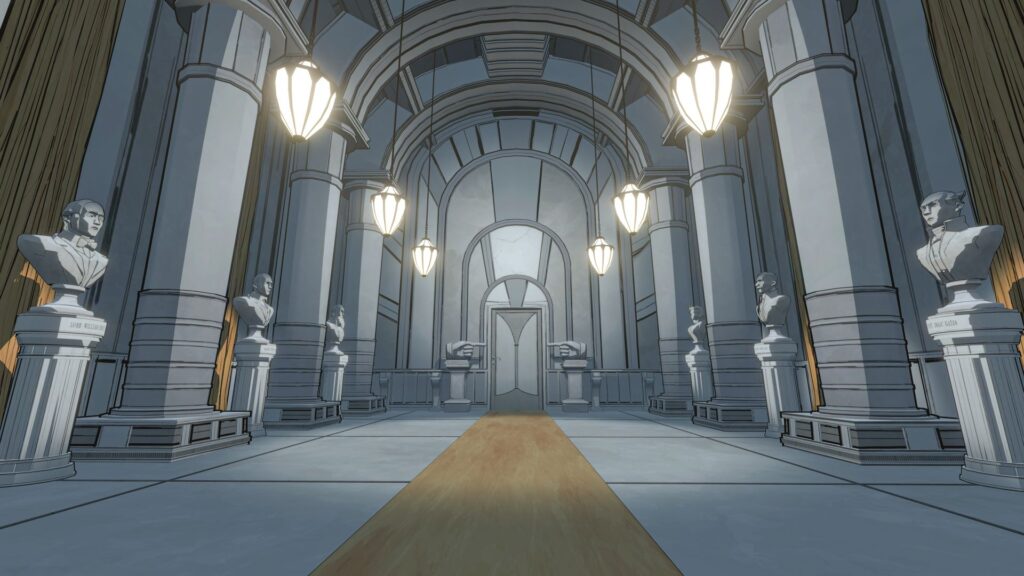
The same is true in Blue Prince, where it pays to remember you can only get the Pump Room if you’ve drafted the Pool first—which means you can narrow your drafting options by simply never picking the pool. Or you can deliberately pick the Pool early if you desperately want the Pump Room asap.
It creates the sense that you’re always learning and putting your knowledge to use. If your Great Uncle’s house was a known entity at all times—ignoring all the puzzle elements that would no longer work—you wouldn’t have that sensation.
It also helps with the other major element of the game—resource management. Steps are your primary resource—managing them is your number one task each day. But lacking keys, gems and coins can all end your run in their own ways, which means it pays to keep an eye on how you’re spending those too. And items—like the shovel, the sledgehammer and the lockpick—all alter your resource acquisition and spending, which makes them important as well.
The resource management actually solves one of my main gripes with puzzle games—the lack of tension. Having only 50 steps (it costs a step to move from one room to another) starts a countdown on what you can do in a day. You can acquire more steps, but to do that is a puzzle you need to solve in and of itself.
And it can lead to glorious moments where you calculate that you haven’t got enough steps to make it to your goal, but you press on anyway (because why wouldn’t you?) and you happen across a banana along the way—giving you three steps, just enough energy to get through. It can also lead to heartbreaking scenes, such as the time I came up short on energy because I’d forgotten to account for the two extra steps it would cost me to traverse the Gymnasium.
People are, broadly speaking, bad at understanding odds and statistics, and it is easy to feel like RNG has fucked you in Blue Prince. I don’t think BP’s balance is perfect—in fact there are absolutely bugs relating to items and rooms showing up—but I do think people will generally have a better time with the game if they try to refocus on the times they got lucky instead of the opposite. The bananas instead of the gyms.
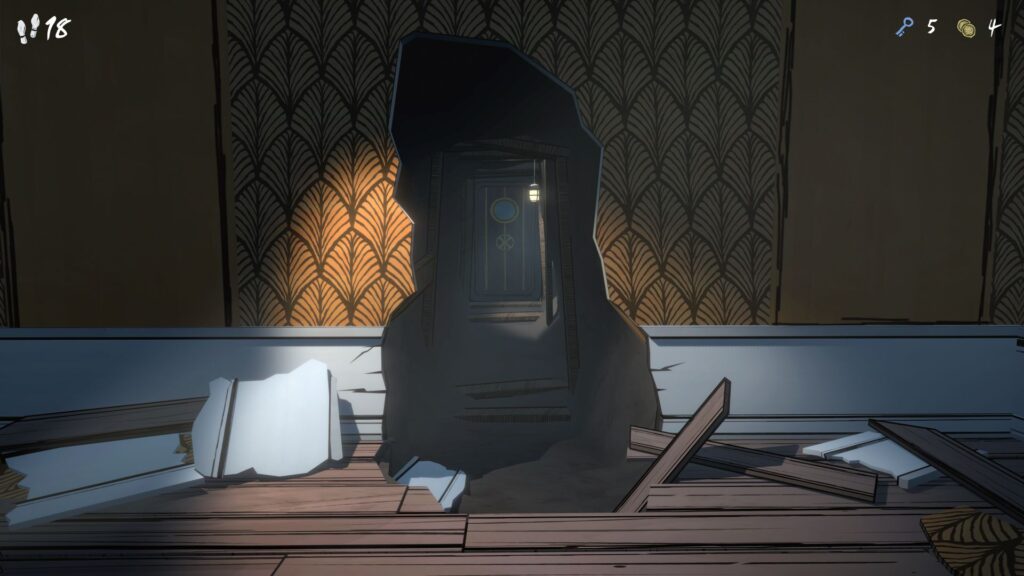
The other thing that will serve players well is if they are about to compartmentalise their successes.
The goal in BP is to get to room 46. That’s how you roll credits—which is far from the end of the game, but it is an end. But you will quickly come to learn that it’s not as simple as drafting a maze-like path to the antechamber.
Imagine a jigsaw puzzle, right? The goal is to construct the picture on the box. In Blue Prince, it’s like you only know that you are putting something together, but you don’t know the broad image, the number or even the location of all the pieces of the puzzle.
That means anytime you acquire new information, that is a massive success. That’s the discovery generation engine in action, and activating it gets you one step closer to your goals.
Because you don’t know what you don’t know in Blue Prince, so knowing something new is huge. It’s difficult to even talk about the game without risking robbing players of some of this. Getting hints is fraught with peril, as some puzzles in BP are solved with information you didn’t even know was related. Didn’t know you needed. Didn’t know.
This mystery has another effect, too. It is a shroud behind which the game can hide from criticism.
It can be difficult to understand where Blue Prince falters, because the other side of the coin of compartmentalisation is dismissing failures. By playing the game and celebrating your qualified successes, it’s easy to fall into the trap of ignoring moments when you don’t achieve your goals. It’s a common pitfall, and as an ‘optimiser’ it’s one I often fall into.
I don’t need to optimise the fun out of a game if I can tell myself I am already playing optimally by actively ignoring how I am failing.
When a player does start to critically analyse their failures, however, it becomes apparent that the fault is not all their own. People are bad at understanding odds and statistics, right? Especially when faced with survivorship biases. This is a known thing. “I’m on a hot streak!” is the catchcry of every soon-to-be-loser in any casino around the world. “I’m due a win!” is the much more depressing call of every already-a-loser.
Humans are pattern recognition machines wrapped in horny sacks of meat and bone. It’s how we hunted the saber-toothed tiger to extinction before it did the same to us, it’s why we were able to invent agriculture and then able to mechanise it. Pattern recognition is the neurological device by which humanity is able to accelerate evolution.
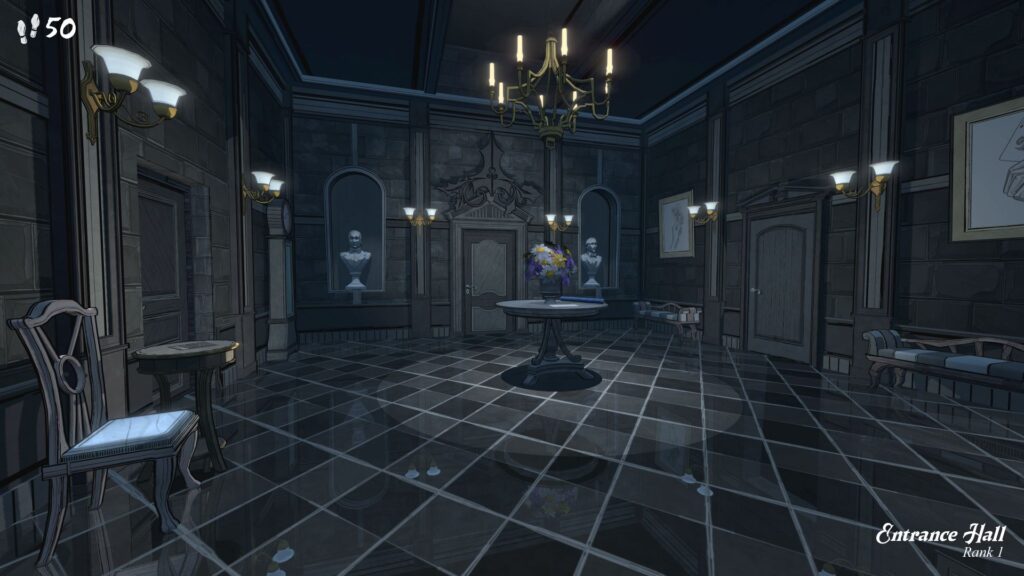
And so it is natural for someone to notice when they have ‘failed to get X room Y times in a row’. That ‘A item hasn’t shown up in 40 runs’. Doing this doesn’t require critical thinking—it happens instinctually. As I said earlier, it is in a player’s best interests to ignore the alarm bell ringing in their head that tells them a 95% chance to hit in XCOM will “always” fail.
But as I also said earlier, Blue Prince has bugs, and those bugs impact the chance of certain dice rolls occurring. I know for 100% fact that an item required for late game progress was not showing up as often as it was supposed to. I know this because the very first patch for the game fixed this.
I would argue that there are other bugs, but I do not know for certain that this is the case. There is a room related to the aforementioned item that would not spawn in my game. And once I managed to cast free the “shackles” of having fun and I started to optimise my play in Blue Prince, I managed to confirmation of it not spawning (of a sort).
That is, I used CheatEngine to give myself unlimited rerolls, and I rolled a hundred times (in a variety of different positions) and the room in question did not show up.
Here we return to the pattern recognition machine. My wife, who I was playing Blue Prince with (it’s a fantastic co-operative experience), reasoned that some rooms simply aren’t in the deck on some days. That was the pattern she had noticed. I disagreed, only because there was nothing to indicate that the game operated under that ruleset. It is a fair and good observation, but I am fairly sure Blue Prince doesn’t work that way.
I know that some rooms only spawn under certain conditions. The Pool Room is needed for the Pump Room to show. Other rooms I won’t mention operate under similar conditions. Having not found the room I was testing for (because how could I) I couldn’t be certain that I wasn’t failing to fulfil these conditions, but I did go searching for information about the room, and I found nothing. And that information is always somewhere in your Great Uncle’s mansion.
And then, after the second patch dropped, the room started showing up. No change is mentioned in the patch notes about it.
If you try to bring this up online, your concerns are dismissed as ‘that’s RNG’. And while the odds are infinitesimally small, that’s true. Maybe I just got very, very, very, very, very unlucky. But I didn’t arrive at my experiment by chance—it was after I had noticed the pattern of the room not showing up in the first place.
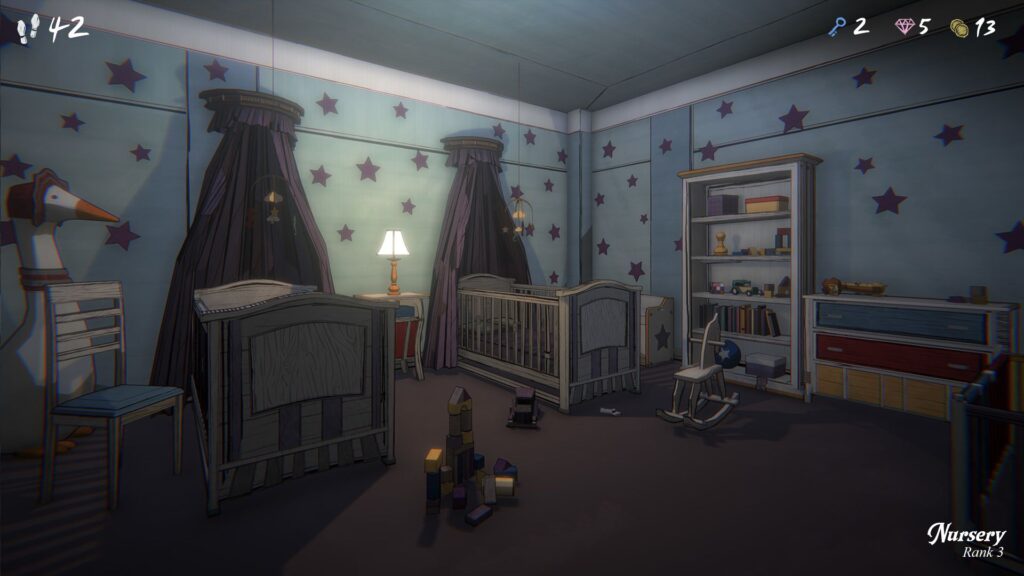
And yeah, again, that’s RNG right?
But do you see how ‘that’s RNG’ can be used to dismiss valid criticism? We already know that the game has been patched to rectify problematic RNG once. And once that worm of doubt is in your head, it gets harder to compartmentalise.
It leads to the other problem Blue Prince has. The real one. The one most people won’t come back from, the issue you will probably drop the game over.
Eventually you run out of successes. When learning something new is a win, either you keep learning forever or eventually you start losing a lot. And Blue Prince is finite. It has an end point. I didn’t reach that end point. I don’t actually know if anyone has.
But it doesn’t matter, because at a certain point, your runs simply end in failure. There are only so many rooms to discover—there’s literally a trophy for getting them all. There’s only so many items you can get. There’s a trophy for that, too. Only so many letters to discover, safes to crack, paintings to stare at.
And when you’ve done all those, when you’ve done all the obvious things and a lot of the non-obvious things too, all you’re left with is a house you can’t specifically control and the whims of lady luck. Need a Pump Room? Well you already know to get the Pool Room, right. Need that Pump Room to specifically connect to another room? Well the Pump Room only has two doors—one of them your entry pathway—so you better already have it when you draft, or you have to get lucky on your next three room pull.
When you’re losing, it’s better to lose fast—and that’s when you notice nothing in Blue Prince happens fast. When you start a new day, you have to wait seven seconds while the game’s camera slowly pans over the front driveway and into the lobby before you get control again. When you open a safe in a room, you have to do that every goddamn time. Some of the safes are hidden—you have to reveal them every goddamn time too. There’s supposed to be a method for remaining logged into the fucking computers, but that doesn’t seem to work —so every time you want to do something on the estate’s PCs, you have to enter the same password you’ve no-doubt typed four thousand times.
When you’re slowly plodding through your new mansion, there’s a charm to the way the game forces you to take time. There’s a meditative element to the way it wants you to slow down.
When it’s day 105 and you’re drafting the Pump Room again hoping a certain other room shows up this time, and resetting the day when it doesn’t again, you begin to hate how slow everything is. Poor little Simon, with his 50 steps per day, he must have a wasting disease the way he inches his way through the mansion and keels over if he has to walk from one end of his house to the other twice.
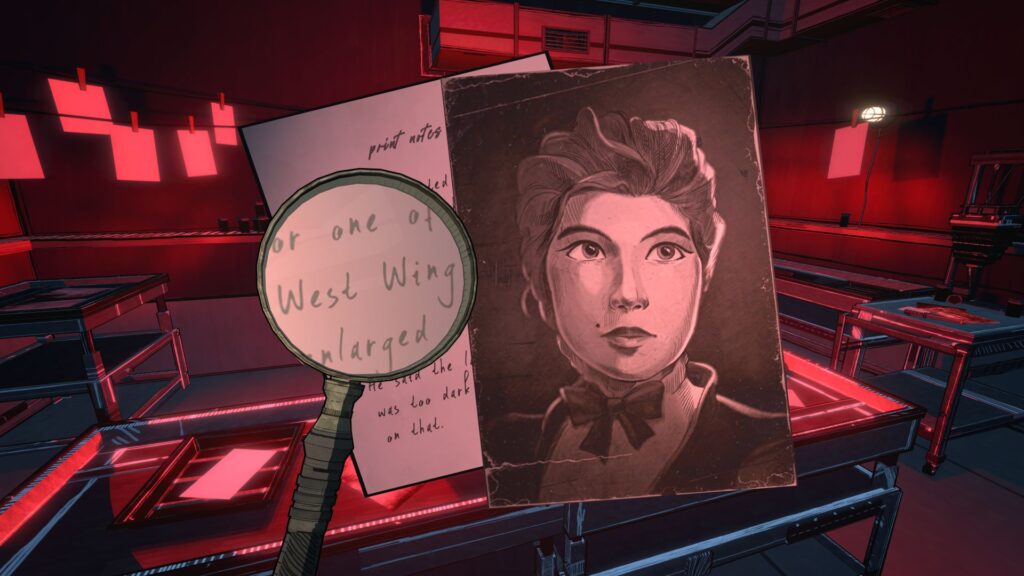
While I’m complaining, I cannot believe in 2025 there’s a game structured almost entirely around reading that has pages upon pages of text written in cursive with no on-screen printed display of that text. There are no accessibility features in Blue Prince at all. I know it’s a small-team project, but that still kind-of sucks.
If you are like me you will fall into Blue Prince completely. You’ll scratch out page upon page of notes, go to bed and dream about drafting rooms, go to work mentally piecing together clues and eagerly waiting to go home to test your theories. If you’re capable at drafting, the RNG won’t impact you too heavily on your journey to Room 46.
If you’re lucky, you’ll reach Room 46, solve a few of the other puzzles along the way, and then you’ll ditch the game, never to be thought of again.
If you’re unlucky (like me), you’ll hold on to the idea of the game long past that point, until you begin to resent its missteps.
In this, Blue Prince posed for me one final head-scratcher. How do I critically analyse a game I have come to resent? How do I review a game when I know my gut feeling for it is driven largely by its last few moments?
It’s not like I haven’t run into this problem before. Mass Effect 3 is probably the grandest example—a 27 course meal that ends with the player choosing from once of three different coloured pieces of sour candy.
Blue Prince isn’t a grand banquet, though. It’s a buffet. And when you return from your table having gorged yourself on its delights, you’ll find something new on offer. But as the dinner wears on, you’ll see more of the same, you’ll feel annoyed at the repetition, and you’ll curse the kitchen staff for never putting out that one dish that you desperately need to feel full (while secretly knowing it probably still won’t sate you).
I still absolutely think you should play Blue Prince. Just exercise some portion control.

